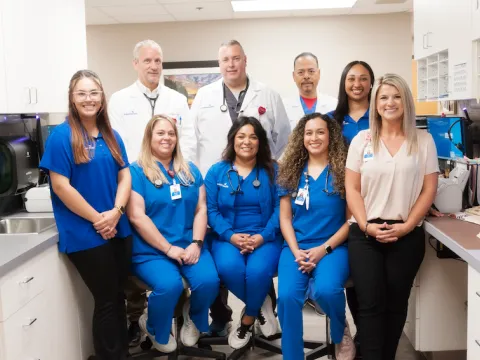- Robert Channell

A silent threat looms over the lives of countless women. Heart disease, often misunderstood as a “man’s disease,” is the leading cause of death for both women and men in the U.S. Despite this, many women remain unaware of their unique risks.
Lake County resident Collene Shover’s life was a tapestry of shortness of breath and fatigue for two long years. Despite her high cholesterol, the notion of heart issues never crossed her mind. But on the morning of Sept. 30, 2024, Shover awoke with an unsettling feeling, signaling the presence of the silent threat that had been quietly weaving its way into her life.
“I was at work. My wrist was hurting and my arm started hurting. I thought it was because I had helped my daughter move,”

said Shover. “I started having chest pains. We checked my blood pressure, which was extremely high. I almost went home, but I started sweating, so we called 911.”
As the echoing sound of the ambulance dissipated when she entered the AdventHealth Waterman emergency department, it was discovered Shover had a widowmaker heart attack. Her heart was 100% blocked and she was rushed to the cardiac catheterization lab where two stents were placed to restore her blood flow.
As February marks Heart Health Month, Dr. Faithful Osawe, a cardiologist at AdventHealth Waterman, is passionate about educating women on the importance of heart health.

"Heart disease doesn't discriminate," emphasized Osawe. "It's a myth that it only affects men. In fact, about 60 million women in the U.S. are living with a form of heart disease. To protect their hearts, women must understand their risk factors and take proactive steps. What is striking in women’s presentation is that it can present atypically as compared to men which may not raise alarm until it is quite late.”
Some of those risk factors for women include:
- Menopause
- Family history of early heart disease
- Pregnancy: miscarriage, preterm delivery, gestational diabetes, preeclampsia, high blood pressure
- Types of birth control, hormone replacement therapy, polycystic ovarian syndrome
- Smoking
- Lack of physical activity
- Emotional stress
- Depression and anxiety
- Type 2 Diabetes
- Polysubstance abuse
- Other health conditions such as high blood pressure, high cholesterol and being overweight, autoimmune diseases such as systemic lupus erythematosus (SLE).
"Simple lifestyle changes – like eating well, staying active and managing stress – can make a big difference,” she added.
Signs of a woman’s heart attack can differ from a man’s classic symptoms. For both genders, chest pain is the most common symptom of heart attack, as is nausea, vomiting, and jaw, neck or back pain.
However, women are more likely to have symptoms that may seem unrelated to a heart attack, such as:
- Shortness of breath, a very common symptom of heart attacks in women.
- Pain or pressure in the lower chest or abdomen
- Upper back pain
- Fainting
- Indigestion
- Extreme fatigue
“Education and awareness are the first steps towards prevention,” said Osawe. “It's important for women to listen to their bodies and seek medical attention if something feels off. Talk to your health care provider about your risk factors.”
Shover explained she feels like a new person and has lost 35 pounds in the last four months.
“The staff was amazing. They took time to explain and educate me on what was happening as I went through all of this,” added Shover. “Women should look for these warning signs. Pay attention to what their body is telling them. I am feeling better now than I have in years.”
AdventHealth Waterman’s commitment to exceptional heart care hasn’t gone unnoticed. In 2025, the hospital was ranked among the top 9% of America’s Best Hospitals for Heart Care by the Women’s Choice Award and recognized nationally by U.S. News and World Report for its expertise in heart failure care. Additionally, the Society of Thoracic Surgeons has highlighted AdventHealth Waterman as the only program in Lake County for advanced cardiac surgeries, including combined mitral valve repair and replacement, as well as coronary artery bypass grafting.
It's never too early to protect your heart. Start by taking the AdventHealth online heart disease risk assessment at UnbeatableHeartCare.com. High-risk results are sent immediately to the AdventHealth clinical team for follow-up.
Recent News

A new chapter begins: AdventHealth Avista opens its on-campus surgery center
This milestone marks a meaningful new chapter for a team whose history stretches back more than two decades.

AdventHealth Porter Performs Rare, Complex Robotic Kidney Cancer Surgery
AdventHealth Porter has reached an extraordinary milestone in surgical innovation, completing what is believed to be the first robotic left radical nephrectomy with inferior vena cava (IVC)...

Amanda Robinson, DO, joins AdventHealth Medical Group Family Medicine, Internal Medicine & Pediatrics at Curtis Parkway
AdventHealth is pleased to announce that Amanda Robinson, DO, has joined AdventHealth Medical Group Family Medicine, Internal Medicine & Pediatrics at Curtis Parkway.

New hospital brings world-class, whole-person care to Minneola
AdventHealth Minneola will bring nationally recognized care close to home in South Lake County.

New surgeon expands local access to advanced colorectal care in Volusia County
Dr. Mark Heimberger joins AdventHealth as part of its continued investment in bringing minimally invasive and robotic colorectal treatment options to the region’s growing community.

AdventHealth Lake Placid launches Low Dose Lung Screening CT program to help detect cancer early
AdventHealth Lake Placid has launched a new Low Dose Lung Screening CT program, bringing this life-saving service closer to home for people who live in and around Lake Placid.

Delivering on the mission: AdventHealth Supply Chain and Business Services' impact is part of every patient story
Every day, more than 1,500 Supply Chain and Business Services team members work behind the scenes with more than 3,000 suppliers to support how AdventHealth patients receive care.

Albit Paoli, MD joins AdventHealth Medical Group Orthopedics & Sports Medicine
AdventHealth is pleased to announce that Albit Paoli, MD, has joined AdventHealth Medical Group Orthopedics & Sports Medicine at Calhoun and AdventHealth Medical Group Orthopedics & Sports Medicine at...

AdventHealth expands access to primary care in the heart of DeLand
AdventHealth has opened a new Primary Care+ location in the heart of downtown DeLand, giving residents a simple way to get everyday care close to where life happens. The primary care practice offers...

Fueling healthy futures for Flagler’s student athletes
Early practices, full class schedules, and evening games can push student athletes to their limits, and proper nutrition is essential to keeping them strong and focused. AdventHealth has introduced...

AHMG Cardiology at Dalton earns nuclear cardiology accreditation
AdventHealth Medical Group Cardiology at Dalton has earned a three-year accreditation in Nuclear Cardiology from the Intersocietal Accreditation Commission (IAC).

New orthopedic provider expands access to compassionate care for families in WNC
AdventHealth is welcoming Beth Mitchell, PA-C, an experienced orthopedic provider bringing warm, whole-person care to patients across Haywood County and the surrounding Western North Carolina region.
